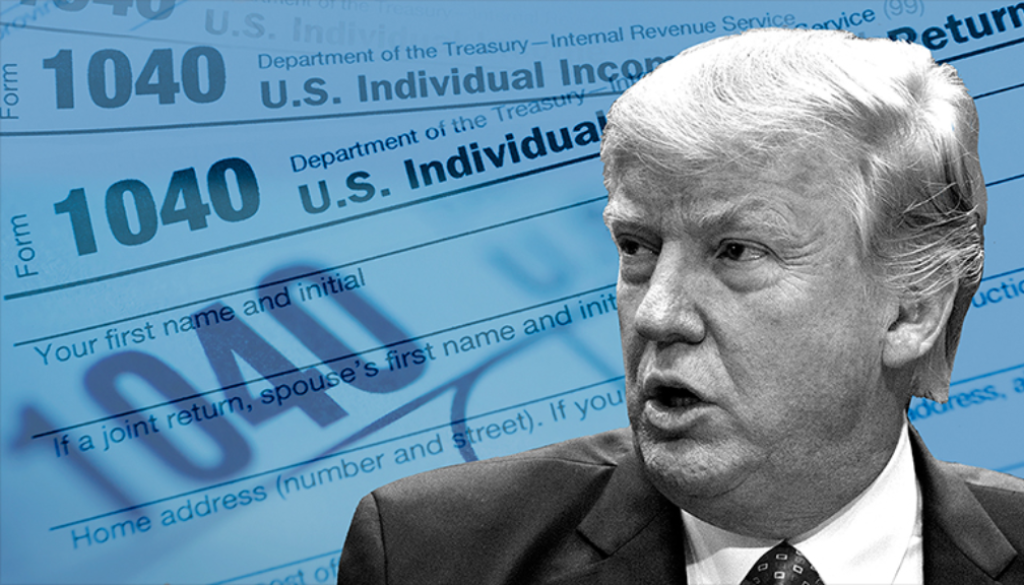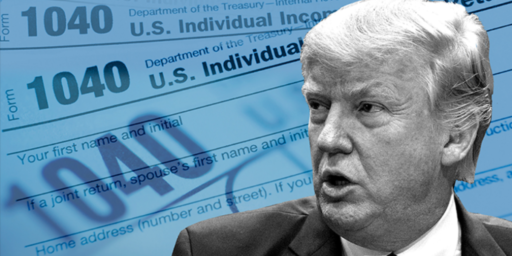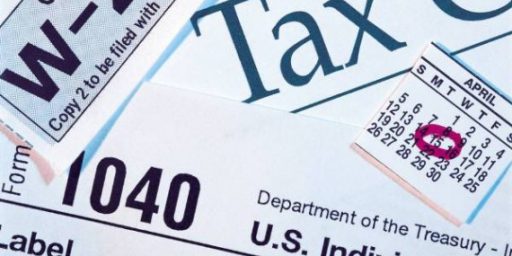Federal Judge Blocks Law Requiring Candidates To Release Tax Returns
Late last week, a Federal Judge blocked a California law requiring candidates for President and other offices to make copies of their tax returns public.

Late last week, a Federal Judge in California issued a temporary block on a law passed by the state legislature that would purport to require candidates for President to make their tax return public in order to get on the ballot in the Golden State:
A federal judge ordered a temporary injunction Thursday against California’s first-in-the-nation law requiring candidates to disclose their tax returns for a spot on the presidential primary ballot, an early victory for President Trump but a decision that will undoubtedly be appealed by state officials.
U.S. District Judge Morrison C. England Jr. said he would issue a final ruling by the end of the month but took the unusual step of issuing the tentative order from the bench. He said there would be “irreparable harm without temporary relief” for Trump and other candidates from the law signed by Gov. Gavin Newsom in July.
England spent much of the court proceeding on the question of whether a long-standing federal financial disclosure law preempts any additional rules that a state could impose. The federal law, known as the Ethics in Government Act, or EIGA, was originally passed in 1978 and applies to a range of top federal officials. Trump has filed the required annual report, which provides an overview of his finances, most recently in May.
“Do we even need to get here if EIGA preempts” the new California law? England asked attorneys for the state. “Is that it?”
The hearing in a Sacramento courtroom consolidated arguments made in five separate lawsuits filed since Senate Bill 27 was signed into law. Attorneys on both sides noted that timing is tight on the legal challenge: Under provisions of SB 27, candidates must submit tax returns no later than Nov. 26 to be eligible for the March 3 primary.
Roque “Rocky” De La Fuente, who filed one of the lawsuits and was a minor-party presidential candidate in 2016 after failing to win support in the Democratic Party, said he supports some limited, voluntary tax return disclosure.
“I don’t think it should be mandated by the state,” De La Fuente told reporters outside the courtroom.
California Secretary of State Alex Padilla, who as chief elections officer was named a defendant in the lawsuits, said he would wait to see the written ruling before deciding whether to appeal.
“We remain firm in our belief that SB 27 is constitutional and provides invaluable transparency for voters as they decide who will hold the most powerful office in the United States,” Padilla said in a statement.
(…)
California Deputy Atty. Gen. Peter Chang told the court that states already have their own unique primary election rules and that SB 27 affects not only the chief executive of the nation but also that of California. “This is what the voters need to elect their executives,” he said.
But Thomas McCarthy, an attorney representing the president, told the judge the U.S. Constitution sets out rules for running for the nation’s highest office that are “fixed and unalterable” by individual states. He said California voters may have an interest in a presidential candidate’s tax returns, but the state “cannot try to inform” voters beyond the basic information.
England seemed to suggest there could be reasons to rein in electoral rules that leave presidential candidates scrambling to provide different information in different states.
“Wouldn’t that create a hodgepodge of laws around the country?” he asked.
The California law requires any candidate for president or governor who seeks a spot on the statewide primary ballot to give state officials copies of Internal Revenue Service tax forms from the last five years of filings. After personal financial information is redacted, copies of those documentswould be made available for public inspection.
The law does not apply to any candidates seeking office other than president or governor, including those vying for seats in the California Legislature or Congress, and itwould have no effect on the November general election. In practical terms, should Trump be kept off the primary ballot, he would still have the opportunity to receive votes for president in the fall as the Republican Party nominee.
A California-based federal judge said today he intends to issue a preliminary injunction suspending a new state law that would require Donald Trump and other candidates to release their tax returns to appear on primary ballots.
Plaintiffs representing Trump, his presidential campaign and the California Republican Party sued almost immediately to block California’s law, saying it was an unconstitutional infringement. Gov. Gavin Newsom, a Democrat, signed Senate Bill 27 into law in July.
U.S. District Court Judge Morrison England Jr. seemed consistently skeptical of California’s arguments in favor of the law. He acknowledged the ruling will almost certainly be appealed.
England was appointed to the court in 2002 by President George W. Bush.
“We are encouraged that the federal court tentatively concluded that a preliminary injunction should be granted,” said Jay Sekulow, counsel to Trump. “We look forward to the court’s written order.”
“It remains our position that the law is unconstitutional because states are not permitted to add additional requirements for candidates for president, and that the law violates the Constitution,” he added.
Attorneys for California acknowledged that the law’s impetus was Trump’s refusal to release tax records that could illuminate the workings of his business empire.
“President Trump has started a new custom among presidential candidates, and that’s what the Legislature wanted to avoid,” said attorney Peter Chang. But he maintained that, while the motive may have had partisan roots, the civic justification applies evenly.
“Individuals don’t have the right to run for office. When they choose to run for office, they insert themselves into the public discourse,” Chang argued, and the burden of releasing returns is “outweighed by the state’s compelling interest in informing voters.”
But attorneys seeking to block the law argued otherwise, saying candidates have a right to certain measures of confidentiality.
“There is a preference among conservative voters for that viewpoint of keeping your tax returns private,” said Harmeet Dhillon, who is representing the California Republican Party, calling it “an electoral value to retain their privacy” for many Republicans.
Dhillon raised additional concerns, speaking to reporters outside the courtroom. She said losing Trump from the primary would be a “huge burden” for California Republicans and that eliminating “the most popular Republican in the country from the ballot is going to have a huge downballot effect.”
Much of the courtroom debate turned on the balance between states’ autonomy and the federal government’s supremacy in determining who is eligible for the ballot, with lawyers for the plaintiffs saying federal law is intended to prohibit a state-by-state patchwork.
Beyond that technical argument, opponents warned that the law could disenfranchise millions of voters and, more insidiously, encourage other states to enact additional ballot hurdles — a point Democratic Gov. Jerry Brown made in vetoing a similar bill in 2017. Attorneys mused about states requiring health records, genetic test results and school transcripts.
My previous posts about the California law and similar laws proposed by other states — such as those here, here, and here — have largely focused on the Constitutional arguments against the law that California passed. Specially, that includes the provisions in Articles I and II, set forth at Article I, Section Two, Clause 2 for members of the House of Representatives, Article I, Section Three, Clause 3 for Senators, and Article II, Section 2 Clause 4 for the President and Vice-President. Those provisions, of course, set forth the age and residency requirements that a candidate must meet to be eligible to serve in the respective offices to which they apply.
In US Term Limits v. Thornton, the Supreme Court ruled on the constitutionality of a Missouri law that, much like the California law and tax returns, purported to use ballot access laws as a backdoor to imposing term limits on Members of Congress by denying them ballot access if they have served more than the permitted number of terms, which in that case was three terms for Members of the House and two terms for Senators. Such candidates could still seek reelection via a write-in campaign, but they could not run as either the nominee of a particular party or an Independent candidate. The Court ruled that this provision, which actually became a provision of the state Constitution via a ballot measure, violated the U.S> Constitution because it imposed requirement for holding the office of Congressman or Senator beyond those set forth in Article One, Sections Two and Three, and the Seventeen Amendment, which set forth the residency and age limitations for holding those offices.
The majority opinion written by Justice John Paul Stevens goes through the history behind the qualifications clauses for Congress, the powers of the states to regulate ballot access and the Tenth Amendment argument that was made in favor of the law before ultimately concluding that the attempt to impose term limit by regulating ballot access was unconstitutional. The argument used by the majority in Thornton would seem to be equally applicable to a state law requiring candidates for President to provide copies of their tax returns.
Rather than basing his preliminary ruling on that issue, though, Judge England ruled that the state law was pre-empted by a Federal law called the Ethics in Government Act which requires Federal officials and candidates for office to provide a detailed financial report, something which Trump did early in his 2016 Presidential run. That law does not require, however, that candidates or government officials make their tax returns public. The argument, therefore, is that the California law effectively violates the Supremacy Clause of the Constitution because it purports to impose requirements on candidates that exceed those imposed by Federal law and because it purports to speak on a subject that Congress has already spoken on, This is a far narrower ruling than the Constitutional argument referenced above, but it accomplishes the same result since the law is effectively null and void as long as the injunction remains in place.
Judge England made this preliminary ruling from the bench, so there is no written opinion as of this time although one will apparently follow in the near future. I will post that opinion here at that time.




Don’t think so. The issue in Thornton, term limits, prevented ballot access completely for some candidates. Disclosing filed tax returns doesn’t bar anyone. To me, it seems more akin to a filing requirement – something that anyone can accomplish. Trump may not want to disclose but there is nothing preventing him from doing so.
On a related tangent, it seems darkly ironic that the side that is fighting to disenfranchise folks who can’t provide very specific forms of ID that many don’t have is protesting requiring candidates to provide tax returns they absolutely have as unconstitutional. The former is far more likely to actually bar participation than the latter.
I suspect the judge went for the supremacy argument because of not wanting to get into the thickets of constitutional law. Standard process….
I also suspect that even if they manage to get around the EIGA issue the release-your-tax-forms requirement will get kicked out, because it’s unrelated to either the citizenship or age requirements. If the American populace is indifferent enough about corruption and promises to vote for a POTUS candidate even though he never released his tax forms….well, that’s their right.
We can’t rescue the U.S. from the stupidity of the average voter, much as we would like to.
I recall allegations at the time that, consistent with his later practices, Trump recognized that the detailed financial statements aren’t audited, so he just BSed his way through it.
Until a Red State passes one of these laws, or Congress passes one on a federal level, this is all completely pointless anyway.
Trump is never going to get the Cali electoral votes, so in reality he doesn’t even have to run there.
OT…what is the right cocktail to enjoy while celebrating Impeachment at 5:00 today?
@Daryl and his brother Darryl:
If the law stands, can the California GOP can cancel its primary?
If El Cheeto ins’t on the primary ballot, then any of his challengers can claim a victory. This would worry Trump almost as much as losing the general election.
@Daryl and his brother Darryl:
A Harvey Wallbanger.
@Daryl and his brother Darryl:
“OT…what is the right cocktail to enjoy while celebrating Impeachment at 5:00 today?”
A Moscow Mule.
@Moosebreath:
Black Russian (Kahlua and vodka). It keeps you up while it makes you sleepy.
@Kathy:
“Black Russian (Kahlua and vodka).”
Not in this White House. Adding cream to make a White Russian would be a possibility.
@Daryl and his brother Darryl: It will make a difference to down ballot Republicans.
@Daryl and his brother Darryl: It will make a difference to down ballot Republicans.